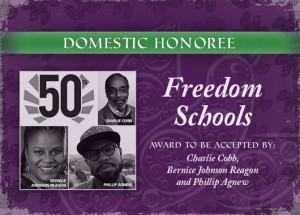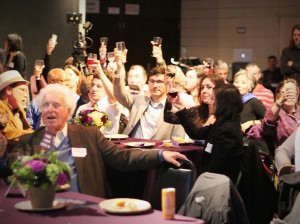 On May 8, 2014, Global Exchange honored the Freedom Schools with the Domestic Human Rights Award, and invited Bernice Johnson Reagon, founder of Freedom Singers and cultural historian, to accept the Award with Charlie Cobb and Phillip Agnew. While she was unable to make it, she sent these remarks. For more on the Freedom Schools, read here.
On May 8, 2014, Global Exchange honored the Freedom Schools with the Domestic Human Rights Award, and invited Bernice Johnson Reagon, founder of Freedom Singers and cultural historian, to accept the Award with Charlie Cobb and Phillip Agnew. While she was unable to make it, she sent these remarks. For more on the Freedom Schools, read here.
I am humbled and extremely grateful that in your deliberations, you have found me worthy of this very special honor.
My understanding of human rights is grounded in being born in the rural area of Dougherty Co. in Southwest Georgia, in being the third of eight children of
Beatrice and Rev. Jesse Johnson, and being a student starting school at the age of three, where the teacher Mamie Daniels told the PTA that as soon as they are toilet trained, send them to school. Mrs. Daniels got the PTA to run a water pipe from a farm a block away so that the one-room school house had a faucet for water for the first time. She not only taught seven grades in this one room, but she also created the Easter Sunday program. When a four-year child died in our small community, she organized the funeral and had me, at the age of seven, to sing my first funeral song, “What Are They Doing in Heaven Today?” composed by Charles Albert Tindley.
In our side of the county, when children finished the seventh grade, they could attend junior and senior high school in Albany, the county seat. However, there was no transportation provided for the students to get there. So, my uncle allowed his oldest sons to drive his car so that elementary school graduates could continue their education. When I completed seventh grade, the car was full; so there was no room for me and my cousin Andrew. Mrs. Daniels rehearsed my uncle and my father and had them to go to the superintendent of schools to put on a new bus for our side of the county, and for the first time, there was a school bus that picked up students from the county schools and took them daily to junior and senior high schools in the city.
I begin here because here because as a child I was a living witness to a woman named Mrs. Mamie Daniels who absolutely refused to accept what Dougherty County offered her as a teacher and to us as students. And I walked through the changes she was able to create in organizing the parents of the PTA. This might seem like a limited notion of human rights, but for me, it is foundational. I actually lived through the struggle to create new possibilities for a new generation of young people led by a committed teacher who could see for us well beyond our vision. I lived through watching her change the possibilities for us and watching my parents executing strategies to create those changes in a way that did not expose her as the conceptualizer. The notion that there could be something different, something more than one’s reality and that it is worth the risk to lose what you had in an effort to reach for it is grounded in the culture into which I was born.
It is an honor that upon looking at my life and work as a student leader against racial segregation in Albany, GA, I was never alone. I never led a march without others joining, never went into a cell that was not packed by others also ready to take anything the system we were trying to destroy threw at us. It is important to share that the march I led in Albany with my best friend, Annette Jones, meant that the two of us were in the front of the line, but I want you to know as we walked forward from Albany State College to City Hall, three SNCC field secretaries, Charles Sherrod, Charlie Jones, and Cordell Reagon, walked backwards in front of us. In order to get to the jail from the campus, one had to cross the Flint River Bridge. When we crossed the bridge, Annette and I as leaders were actually walking into the protective presence of one of the three SNCC organizers. A second was walking up and down the line next to the river, facing forward; the third was walking in the line of traffic backwards. They alternated their positions as we moved toward City Hall. It was an amazing experience being a leader and humbling in understanding the human buffer created for us by the SNCC organizers.
When we got to the jail, we circled the jail house and headed back across the bridge, and not being able to go back to the campus, we went into Union Baptist Church at the invitation of the pastor Rev. William Boyd. SNCC Secretary Charlie Jones said, “Bernice sing a song.” I opened my mouth and sang “Over my head, I see freedom in the air”. Without a conscious thought, I had changed the words to the spiritual “Over My Head, I
Hear Music in the Air” so that it named what it was we were creating by walking as we did in a new way in the streets of Albany, Georgia. In that action, I had gained access to a kind of permission to use what was a 19th century database for fuel for our 20th century freedom struggle.
There is very little I can actually say that would explain the transformation that occurred within me except to say that I had in my life stepped outside of the safety zone of family and school and stepped on new ground, joining those facing down the racist system of legal segregation in the country in which I was born.
Since that time, I have never shifted. It was a new understanding that I actually had a life to offer, joining a growing community challenging injustice wherever we found it. And on this day, I also found that I could lead with my voice and that I could somehow find songs and sounds that would help our people hold new ground as we took it.
This journeying has led me to join with those who mounted a struggle against our country’s policies that led to the Vietnam War, to joining those who questioned why there needed to be the creation of powerful nuclear weapons, to repositioning my ground with those who declared that women were full living beings, second to no others, with the capability to hold down responsibilities on any level that existed within the societies in which we were members. It also led me to become a voice, celebrating and insisting on the rights of those who form partnerships across and within gender as protected and respected choosings.
As a mother, a single parent, I celebrate the journey traveled, creating new environments for children and the young people who will move pass my living to create tomorrows I will not witness. It has been a journey that I cherish and that I am blessed to travel.
Bernice Johnson Reagon, May 8, 2014





 On May 8, 2014, Global Exchange honored the Freedom Schools with the Domestic Human Rights Award, and invited Bernice Johnson Reagon, founder of Freedom Singers and cultural historian, to accept the Award with Charlie Cobb and Phillip Agnew. While she was unable to make it, she sent these remarks. For more on the
On May 8, 2014, Global Exchange honored the Freedom Schools with the Domestic Human Rights Award, and invited Bernice Johnson Reagon, founder of Freedom Singers and cultural historian, to accept the Award with Charlie Cobb and Phillip Agnew. While she was unable to make it, she sent these remarks. For more on the